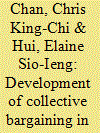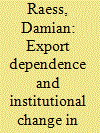| Srl | Item |
| 1 |
ID:
131958


|
|
|
|
|
| Publication |
2014.
|
| Summary/Abstract |
2010 was a turbulent year for labour relations in China. The wave of strikes sparked by the Honda workers has highlighted the urgent need for trade union reform and workplace collective bargaining. In response to this turbulence, the Chinese government has stepped up efforts to promote the practice of collective bargaining, which had been neglected under the existing "individual rights-based" labour regulatory framework. In the midst of rapid social and policy changes, this article aims to examine the effect of labour strikes on the development of collective bargaining in China. The authors argue that, driven by growing labour protests, the collective negotiation process in China is undergoing a transition, from "collective consultation as a formality," through a stage of "collective bargaining by riot," and towards "party state-led collective bargaining." This transition, however, is unlikely to reach the stage of "worker-led collective bargaining" in the near future.
|
|
|
|
|
|
|
|
|
|
|
|
|
|
|
|
| 2 |
ID:
133646


|
|
|
|
|
| Publication |
2014.
|
| Summary/Abstract |
This article explores the adjustment of wage bargaining institutions to international trade in Germany. Embracing IPE as opposed to CPE lenses yields a novel interpretation of change in the institution of wage bargaining. Export dependence of a sector, we argue, has destabilizing effects for industry-wide bargaining by sparking an intra-sectoral cleavage between domestic- and export-oriented enterprises. Specifically, the greater the degree of export dependence of a sector, the greater the degree to which domestic-oriented enterprises within that sector will abandon collective bargaining. We also explain how workplace employee representation through works councils mitigates this effect, such that the presence of works councils helps domestically oriented firms to hold to collective bargaining agreements in the face of a sector's deepening exposure to export markets. These claims find empirical support in the history of labor relations developments in the metal industry and, especially, in extensive analysis of a cross-section of establishments. Our findings attribute major responsibility to the firms driving globalization for undermining collective bargaining institutions and suggest that economic globalization is a cause of dualization. In all, the article provides fresh ammunition for a version of globalization-induced institutional convergence. [Correction added after online publication on May 28, 2014: "conversion" changed to "convergence" in preceding sentence.]
|
|
|
|
|
|
|
|
|
|
|
|
|
|
|
|